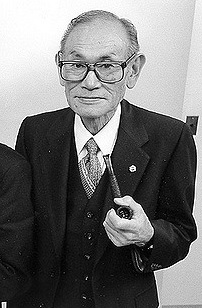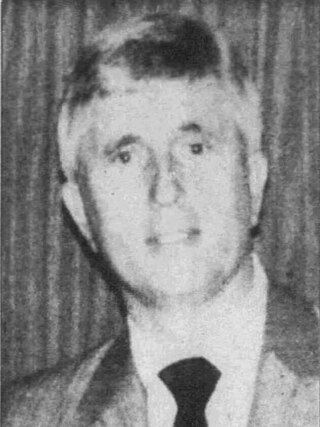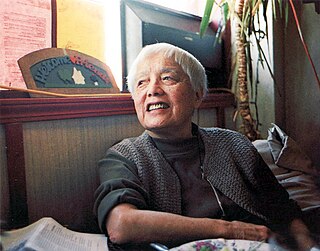
Vincent Jen Chin was an American draftsman of Chinese descent who was killed in a racially motivated assault by two white men, Chrysler plant supervisor Ronald Ebens and his stepson, laid-off autoworker Michael Nitz. Ebens and Nitz assailed Chin following a brawl that took place at a strip club in Highland Park, Michigan, where Chin had been celebrating his bachelor party with friends in advance of his upcoming wedding. A witness described them using anti-Asian racial slurs as they attacked him, ultimately beating him to death.

William Francis Murphy was an American politician, lawyer, and jurist from Michigan. He was a Democrat who was named to the Supreme Court of the United States in 1940 after a political career that included serving as United States Attorney General, 35th Governor of Michigan, and Mayor of Detroit. He also served as the last Governor-General of the Philippines and the first High Commissioner to the Philippines.

Fred Toyosaburo Korematsu was an American civil rights activist who resisted the internment of Japanese Americans during World War II. Shortly after the Imperial Japanese Navy launched its attack on Pearl Harbor, President Franklin D. Roosevelt issued Executive Order 9066, which authorized the removal of individuals of Japanese ancestry living on the West Coast from their homes and their mandatory imprisonment in incarceration camps, but Korematsu instead challenged the orders and became a fugitive.
Helen Zia is a Chinese-American journalist and activist for Asian American and LGBTQ rights. She is considered a key figure in the Asian American movement. After Vincent Chin's murder, Zia helped found American Citizens for Justice, which successfully lobbied for a federal trial. The political actions of this group helped coalesce the growing Asian-American activism in the Midwest. After this incident, Zia remained an outspoken advocate and activist for a wide range of causes, from women's rights to gay rights. Furthermore, she testified at the U.S. Commission on Civil Rights on the racial impact of the news media. Zia is also an accomplished author and has published multiple books about Asian American histories and experiences.
An error of impunity is a lapse in the justice system that results in criminals either remaining at large or receiving sanctions that are below a socially optimal level. The term is used in Brian Forst's book Errors of Justice and in Robert Bohm's introduction to a special edition of The Journal of Criminal Justice on miscarriages of justice. If convicting an innocent person, called a miscarriage of justice, is a Type I error for falsely identifying culpability, then an error of impunity would be a Type II error of failing to find a culpable person guilty.

Charles Coles Diggs Jr. was an American politician from the U.S. state of Michigan who served in the state senate and U.S. House of Representatives. He was the first African American elected to Congress from Michigan.

Ronald Madis Ebens is an American criminal. Ebens, with his stepson Michael Nitz as an accomplice, killed Vincent Chin, a Chinese American man, on June 19, 1982. This led to a federal indictment for violating Chin's civil rights, but only after public outrage at the probationary sentence and small fine imposed by Michigan Third Circuit Court Judge Charles Kaufman. Ebens was found guilty on one count of violating Chin's civil rights and was sentenced to 25 years in prison, but the conviction was overturned on appeal.
The Recorder's Court, in Detroit, Michigan was a state court of limited jurisdiction which had, for most of its history, exclusive jurisdiction over traffic and ordinance matters, and over all felony cases committed in the City of Detroit. Its jurisdiction did not extend to civil suits.
Frank H. Wu is an American law professor and author currently serving as the president of Queens College, City University of New York. He served as the William L. Prosser Distinguished Professor at UC Hastings. He previously served as Chancellor & Dean, receiving unanimous and early renewal for a second term. Wu was also the first Asian American to serve in that position. In November 2015, he announced he would return to teaching. In 2013, the National Jurist ranked Wu as the most influential dean in legal education and the third in the nation among legal educators and advocates influencing the ongoing debate about legal education. He was the first Asian American professor to teach at Howard Law School, as well as the first Asian American to serve as dean of Wayne State University Law School in Detroit, Michigan. At Wayne, he was the youngest law school dean in the nation at the time of his appointment (36). Wu is the author of Yellow: Race in America Beyond Black and White, which was immediately re-printed in hardcover. Arguing for a new paradigm of civil rights that goes beyond a black-white paradigm, while also addressing subtle forms of racial discrimination, the book has become canonical in Asian American Studies and is widely used in classes on the subject. It has been especially influential for debunking the model minority myth and the perpetual foreigner syndrome. Yellow appears in both the film Americanese, an adaptation of American Knees by Shawn Wong, and the book Secret Identities: The Asian American Superhero Anthology. Wu himself has appeared as a character in Asian America: The Movement and the Moment.
Charles Kaufman (1920–2004) was an American judge for the Third Circuit Court of Michigan, with jurisdiction over south-east Michigan and its largest city, Detroit.
Gabriel Jack Chin is an author, legal scholar, and Professor at the University of California, Davis School of Law.
Who Killed Vincent Chin? is a 1987 American documentary film produced and directed by Christine Choy and Renee Tajima-Peña that recounts the murder of Vincent Chin. It was nominated for the Academy Award for Best Documentary Feature. It was later broadcast as part of the PBS series POV.

Vincent Who? is a documentary film that was released in 2009. It details the 1982 murder of Vincent Chin that occurred in Detroit, Michigan.

Grace Lee Boggs was an American author, social activist, philosopher, and feminist. She is known for her years of political collaboration with C. L. R. James and Raya Dunayevskaya in the 1940s and 1950s. In the 1960s, she and James Boggs, her husband of some forty years, took their own political direction. By 1998, she had written four books, including an autobiography. In 2011, still active at the age of 95, she wrote a fifth book, The Next American Revolution: Sustainable Activism for the Twenty-First Century, with Scott Kurashige and published by the University of California Press. She is regarded as a key figure in the Asian American, Black Power, and Civil Rights movements.

Young Corky Lee was a Chinese-American activist, community organizer, photographer, journalist, and the self-proclaimed unofficial Asian American Photographer Laureate. He called himself an "ABC from NYC ... wielding a camera to slay injustices against APAs." His work chronicled and explored the diversity and nuances of Asian American culture often ignored and overlooked by mainstream media, striving to make Asian American history a part of American history.
The Asian American Movement was a sociopolitical movement in which the widespread grassroots effort of Asian Americans affected racial, social and political change in the U.S., reaching its peak in the late 1960s to mid-1970s. During this period Asian Americans promoted anti-war and anti-imperialist activism, directly opposing what was viewed as an unjust Vietnam war. The American Asian Movement (AAM) differs from previous Asian American activism due to its emphasis on Pan-Asianism and its solidarity with U.S. and international Third World movements such as the Third World Liberation Front.

Christine Choy is a Chinese-American filmmaker. She is known for codirecting Who Killed Vincent Chin?, a 1988 film based on the murder of Vincent Jen Chin.

Asian American activism broadly refers to the political movements and social justice activities involving Asian Americans. Since the first wave of Asian immigration to the United States, Asians have been actively engaged in social and political organizing. The early Asian American activism was mainly organized in response to the anti-Asian racism and Asian exclusion laws in the late-nineteenth century, but during this period, there was no sense of collective Asian American identity. Different ethnic groups organized in their own ways to address the discrimination and exclusion laws separately. It was not until the 1960s when the collective identity was developed from the civil rights movements and different Asian ethnic groups started to come together to fight against anti-Asian racism as a whole.

Events from the year 1984 in Michigan.
Frances Kai-Hwa Wang is an American writer and educator based in Michigan and Hawai‘i.










